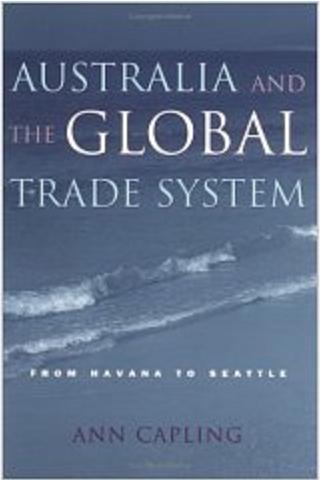Australia and the Global Trade System: From Havana to Seattle
by Ann Capling
Cambridge University Press, Victoria, 2001); pb $A39.95 (260 pages)

This history of Australia's participation in international trade negotiations over the past 50 years is detailed and comprehensive. It draws on careful research into official files and interviews with key participants in these seemingly unending negotiations. This study pays tribute to these "trade warriors", though in retrospect many of the policies pursued were dubious.
The conclusion of this study, that "Australia has been a deeply influential player in the multilateral trading system since its creation" (page 7) overstates the evidence offered.
- Australia took a high profile in the 1946-48 ITO negotiations, when it argued on behalf of under-developed countries that full employment and economic development should be included. But "the negotiating skill and expertise demonstrated" (page 35) also contributed to the US Congress rejecting the Havana Charter. A hollow victory!
- During the difficult early years of the GATT, Australian governments' propensity for trade preferences and protectionism threatened to undermine the fledgling institution. In the McEwen era (1947-71), these policies also imposed severe costs on the Australian economy.
- The brief period of economic reform under Whitlam, which included the 25 per cent across-the-board tariff cut, was reversed with the return of the Fraser Coalition Government.
When the Hawke-Keating Governments adopted economic reform in the mid-1980s (symbolised by floating the Australian dollar and reducing trade barriers unilaterally), this philosophy was absorbed into the tool-box of trade negotiators just embarking on the Uruguay Round negotiations. Convening the Cairns Group and undertaking some "honest brokering" in services' trade enabled Australia's negotiators to influence outcomes and to mediate among the major players (the EU and the US), as well as engaging important non-OECD members. This contribution to the multilateral trading system is justly acclaimed.
At the beginning of her book, Ms Capling defines her purpose, "to provide a political analysis ... of trade policy and trade diplomacy" (page 7). Yet on the next page, she claims to examine "the role of the State in Australia's political and economic development", and "the inter-play between competing economic and political interests in policy-making". The absence of any economic analysis of trade and the linkages between the domestic economy and international trade and capital flows leaves serious gaps in this story-line.
For example, trade negotiations under fixed exchange rates were quite different from those after 1983, when the Australian dollar had floated and capital flows were deregulated. The grudging recognition of comparative advantage and trade theory (page 114) does little to fill the economic vacuum, and probably weakens the relevance of political determinants of trade policy. Any policy has both costs and benefits that have to be evaluated. References to reciprocity, non-discrimination and transparency throughout the volume need explanation. Without an understanding of the economics behind these three founding principles of the multilateral trading system, there is no standard against which to assess the political outcomes. The political inclination towards preferences in Australia until the mid-1960s -- now reappearing in the preoccupation with "free trade" agreements -- indicates more interest in reciprocity than in multilateralism. Usually, large economies (US, EU, Japan) show most interest in reciprocity because they have the bargaining power to influence their terms of trade.
Not only trade negotiators have promoted Australia's profile in the multilateral trading system. Academic economists such as Corden, Swann and Lloyd advanced trade theory, as did Garnaut, Snape and others who do get passing reference in the volume. The "power of (economic) ideas" to influence policymakers is not addressed, while the "essentialism" of politics is rampant. The role of the Tariff Board (and its successors) in changing attitudes is surely relevant to the politics of trade policy.
Another strange imbalance in this book is its undisguised dislike of all things American. All US motives are regarded as malign and no recognition is granted for US success in establishing and sustaining the multilateral system of trade and payments after the chaos of the 1930s and World War II. US trade polices -- like Australian -- are also the product of its domestic policies. Western Europe's self-centred and discriminatory trade policies, on the other hand, are largely ignored or condoned here. Only in references to agricultural trade is the European Commission criticised, although Australia's trade relations with the Commission have been poor throughout.
The book closes with an assessment of the future of the WTO, besieged as it is from many directions. Satisfying developing-country interests while keeping the major players (US and EU) in "the club" will not be easy, especially with increasing resort to preferential trade agreements, which break all three of the founding principles of the multilateral trading system. Overcoming these difficulties depends on commitments by governments to engage with civil society at home and to pursue genuine multilateralism in WTO meeting rooms. This volume provides much advice on how Australia should proceed -- and many traps to be avoided!
No comments:
Post a Comment